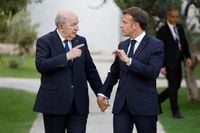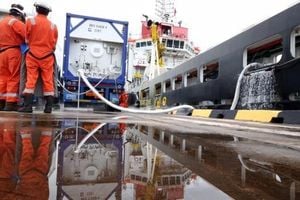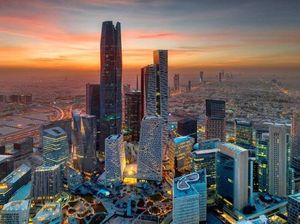In a significant diplomatic move, French President Emmanuel Macron and Algerian President Abdelmadjid Tebboune agreed to revive their bilateral relations during a telephone conversation on March 31, 2025. This decision comes after several months of tensions, marking a new phase of cooperation between the two nations.
The agreement aims to resume collaboration in crucial areas such as security and migration, as outlined in a joint statement released by both presidencies. The dialogue was re-established on a notable occasion, coinciding with the celebration of Eid, suggesting a renewed spirit of friendship and cooperation.
Macron and Tebboune’s conversation was the first contact between the two leaders in eight months, a period that saw one of the most severe crises in Franco-Algerian relations since their independence in 1962. The two leaders expressed their commitment to "renew the fruitful dialogue" that was initially established by the Algiers declaration in August 2022, during Macron's state visit to Algeria.
The joint communiqué emphasized the shared goal of infusing new ambition into the relationship, driven by both a spirit of friendship and a focus on effectiveness and results. This renewed commitment reflects a desire to move beyond past grievances and work towards a more constructive partnership.
As part of this diplomatic effort, French Foreign Minister Jean-Noël Barrot is scheduled to visit Algiers on April 6, 2025. His visit aims to discuss practical details regarding the revival of cooperation in various fields, including security, migration, memorial issues, and economic collaboration, with his Algerian counterpart, Ahmed Attaf.
One pressing issue that emerged during their discussions is the case of Boualem Sansal, a Franco-Algerian writer who was sentenced to five years in prison on March 27, 2025. Macron has expressed hopes for a "gesture of clemency and humanity" from President Tebboune, who is viewed as possessing the insight necessary to navigate this sensitive situation. Recent rumors suggested the possibility of a pardon for Sansal, a scenario that now appears increasingly plausible.
The rekindling of dialogue between Macron and Tebboune signals a potential thaw in relations that have been strained for years. The two nations have a complex history, with Algeria’s struggle for independence from France in the 20th century leaving deep scars that have influenced their interactions. However, both leaders seem determined to chart a new course, focusing on mutual interests and cooperation.
This renewed commitment to dialogue is crucial not only for Franco-Algerian relations but also for broader regional stability. Security cooperation is particularly vital, given the challenges posed by terrorism and organized crime in the Mediterranean region.
Moreover, the migration issue remains a pressing concern for both countries, with Algeria being a transit point for migrants heading to Europe. By working together, France and Algeria can address these challenges more effectively, ensuring a more coordinated response to migration flows.
In the economic realm, both nations stand to gain from enhanced cooperation. Algeria, rich in natural resources, offers significant opportunities for French businesses, while France can provide expertise and investment that could drive economic growth in Algeria.
The upcoming meeting between Macron and Tebboune, as well as Barrot's visit to Algiers, will be pivotal in determining the future trajectory of their bilateral relations. Observers are keenly watching to see if this diplomatic breakthrough can lead to tangible results and a lasting partnership.
As the world continues to grapple with various geopolitical challenges, the revival of Franco-Algerian relations could serve as a model for other nations seeking to overcome historical grievances and build a cooperative future.
In summary, the agreement between Macron and Tebboune represents a hopeful turn in a long and complicated relationship. By focusing on shared goals and mutual benefits, both leaders are taking steps that could lead to a more stable and prosperous future for their nations.




